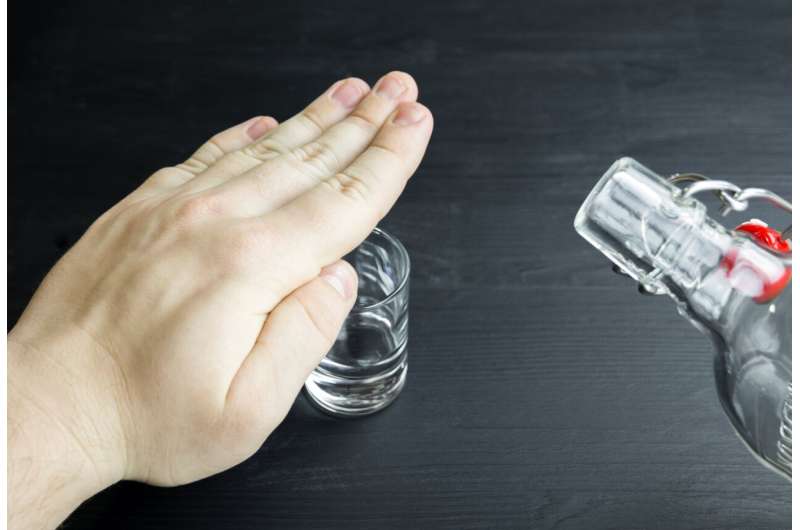This article has been reviewed according to Science X's editorial process and policies. Editors have highlighted the following attributes while ensuring the content's credibility:
fact-checked
peer-reviewed publication
trusted source
proofread
Q&A: When it comes to alcohol, less is more, says researcher

Drinking alcohol—even in moderation—can take a serious toll on the body. According to the National Cancer Institute, there is a strong scientific consensus that drinking alcohol increases the risk for several types of cancer, including head and neck cancer, liver cancer, esophageal cancer, breast cancer, and colorectal cancer. But until recently, the question still remained whether reducing alcohol intake or stopping drinking altogether reduces the risk of cancer.
The International Agency for Research on Cancer (IARC) recently convened a working group of international experts to systematically evaluate the current evidence around limiting or stopping alcohol use and lowering the risk of certain types of cancer. The evaluation, published in the New England Journal of Medicine, concluded that there was sufficient evidence that one's risk of both oral cavity cancer and esophageal cancer will decrease when stopping or cutting back on drinking.
Mary Beth Terry, Ph.D., professor of epidemiology at Columbia's Mailman School of Public Health and associate director of population science and community outreach at the Herbert Irving Comprehensive Cancer Center (HICCC), served on the IARC committee. Below, Dr. Terry discusses the working group's results and what the public should know about the link between alcohol and cancer.
What was the goal of the IARC working group? Why can't we assume that reducing alcohol consumption would lower the risk of cancer?
We evaluated seven different cancers known to be causally related to alcohol—liver cancer, esophageal cancer, head and neck cancer, oral cavity cancer, colorectal cancer, and breast cancer—and whether or not there are enough data to support that reduction or cessation would lower that cancer's risk. The reason why this is important is because there's a long induction time between when you're exposed to something and when you get cancer. Even if something increases your risk of cancer, it's not necessarily the case that if you stop, you will reduce your risk of cancer that quickly.
For example, it's been shown that if you stop smoking, your risk for lung cancer will go down, but it will take a number of years at a population level to see that decrease. Whereas, if you stop smoking, you'll see a quicker reduction in cardiovascular disease, because cardiovascular disease has a shorter time window from when you're exposed to when you're diagnosed. For cancer, it's generally much longer.
How did you evaluate each cancer type?
Basically, the ratings that we give are ranked by whether there is sufficient evidence, limited evidence, or insufficient evidence. The way that this is actually determined is based on the human evidence but also on the mechanistic evidence, such as DNA damage.
In terms of the mechanistic evidence, there were different pathways that pertained to all seven types of cancer. But based on the human evidence, only oral cavity cancer and esophageal cancer had sufficient data to say that reduction or cessation would lower your risk. For breast cancer, colorectal cancer, and larynx cancer, we had more limited data based on the human evidence. Lastly, there was inadequate evidence to make a decision about whether reducing alcohol consumption or cessation was related to lower liver cancer and pharynx cancer.
What does this mean in terms of what people should do about their drinking?
There is already more than sufficient data to support that all seven cancers are causally related to alcohol. What was evaluated for the first time by the IARC was whether reducing alcohol intake can also have an impact on your cancer risk. The overall message here is, there is sufficient evidence to conclude that reducing your intake of alcohol or stopping altogether could reduce the occurrence of two highly fatal cancers, and limited evidence showing that it could reduce the risk of common cancers including breast and colorectal cancers.
More information: Susan M. Gapstur et al, The IARC Perspective on Alcohol Reduction or Cessation and Cancer Risk, New England Journal of Medicine (2023). DOI: 10.1056/NEJMsr2306723

















